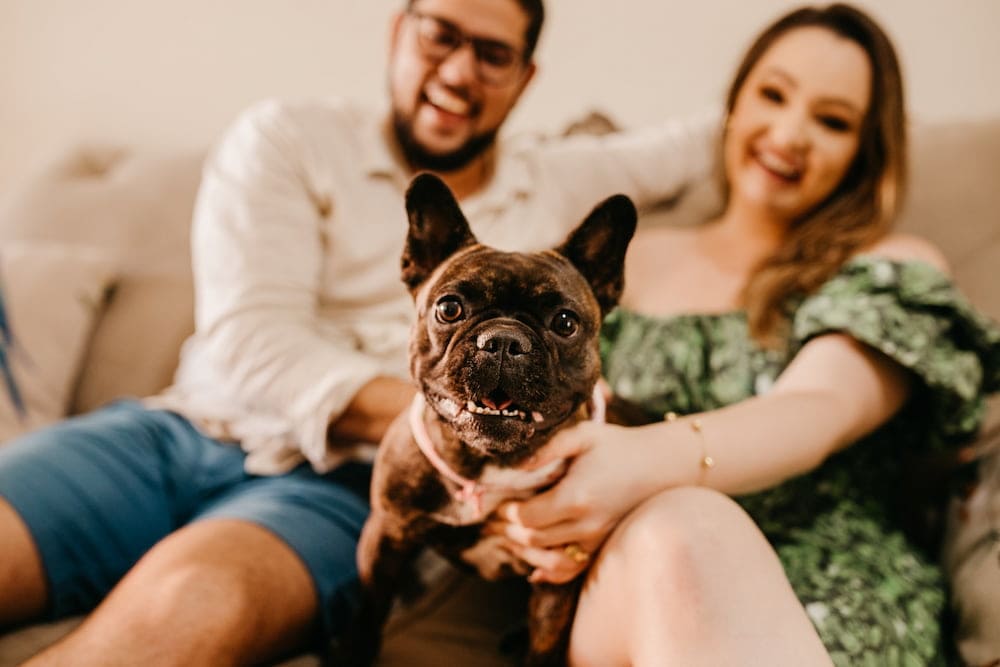Click to Skip Ahead
French Bulldogs can be an easy choice for first-time dog owners. They’re smaller dogs that don’t require much exercise or grooming. Therefore, they’re a great choice, as they allow you to get used to caring for a dog on a low-maintenance canine. Furthermore, they’re extremely adaptable and fit in well in most households. They’re great in the city and the country.
With that said, French Bulldogs aren’t all sunshine and rainbows. They may be prone to health problems of all sorts due to their shortened snout. They’re stubborn and can be challenging to train. They weren’t designed to listen to their masters, as they’re purely companion animals. They’re also flatulent, as they tend to suck in a lot of air as they breathe.
Furthermore, they cannot swim at all, making them prone to drowning. Purchasing a Frenchie if you have a pool could be dangerous.
Just because these dogs are suitable for most new owners doesn’t mean they’re suitable for everyone. Let’s take a look at a few reasons why these dogs may be good first dogs—and some reasons they may not be.

Why French Bulldogs Make Good First-Time Dogs
French Bulldogs are praised as great first-time dogs for a few different reasons. These are:
1. Small and Sturdy
French Bulldogs fall into the small category, making them perfect for apartments and smaller homes. However, they’re also more easily controlled than other dogs. Even if a Frenchie isn’t behaving, you can easily pick the dog up and remove it from the situation. This isn’t typically possible with larger dogs.
Despite their smaller size, they’re quite sturdy, though. They aren’t dainty like some other small dogs, which prevents them from being injured when dropped or stepped on. They’re also able to jump up on couches and other high places without much help.

2. Low-Maintenance
French Bulldogs are very low-maintenance. They have a short coat that’s extremely easy to clean. Besides a quick brush every now and then, Frenchies don’t have many grooming needs. They may need bathing more often than other dogs, though, as they tend to have a doggie odor.
These dogs also don’t need much exercise at all. They’re companion animals with little endurance. Their shortened, deformed snouts also limit their air intake, which lowers their stamina even more. If you want a dog that doesn’t require tons of exercise, Frenchies are a good option for you.
3. Companion Animal
Frenchies were bred as companion animals and as such, they’re very loving and affectionate. They’re friendly with everyone, including other pets and humans. They don’t require tons of socialization (though we still recommend it). Instead, it’s just their innate need to love everyone.
If you’re looking for a dog to be your best friend, a Frenchie may be a great option.

4. Quiet
Unlike other small dogs, Frenchies don’t bark very much. They’re extremely quiet and do well in apartments for this reason. While they will bark sometimes, they aren’t as yappy as other breeds.
This trait is lucky, as they can be challenging to train.
Why You May Not Want a French Bulldog
With that said, there are some reasons why you may not want a Frenchie. These dogs aren’t perfect and are particularly known for their range of health problems. They’re also extremely expensive, making them hard to own.
1. Stressful Sounds
Frenchies are known for making all sorts of strange sounds, such as snorting and wheezing. They snore loudly and may even need to catch their breath after doing nothing more than sitting up. Their squished faces make it hard for them to breathe, so they tend to sound like they’ve just run a mile all the time. Some people don’t mind all these sounds, but others find them stressful. It can sound like there is something wrong with them when there really isn’t.

2. Gassiness
French Bulldogs cannot breathe normally. They tend to suck in a lot of air, which leads to gassiness. Therefore, they can be pretty smelly dogs. The shorter a dog’s snout, the gassier the dog will be. They’re flatulent to a fault, which turns many people off. However, some aren’t bothered by this. You’ll need to figure out what category you fall into before you decide to adopt one.
3. Difficult to Train
Frenchies are challenging to train. They weren’t bred to listen to humans. Instead, they’re solely companion animals. Therefore, they can be difficult to understand and may even struggle with basic commands. Getting them housebroken is a challenge you should expect to take months. For one reason or another, these dogs just have a harder time with it than most.
You should get your dog into obedience classes quickly. Puppy classes can be extremely helpful. Most Frenchies do great in group classes. However, some of these may move too quickly for your tiny dog, so you may need to shift to private classes (or just don’t expect as much success).

4. Health Problems
French Bulldogs have shortened snouts, leading to them having Brachycephaly Airway Obstructive syndrome. They have a hard time breathing due to their shortened face, which can cause all sorts of different conditions. They’re more prone to heat exhaustion and exercise fatigue than other dogs. They also have a harder time with anesthesia, as it slows down a dog’s breathing. This puts them at a higher risk of complications during any surgery.
French Bulldogs only have an average life expectancy of 4.93 years according to a study in the United Kingdom. Of course, many will live far longer than this average. Practically all Frenchies require artificial insemination and Caesarean sections. Their body shape does not allow them to breed properly.
5. Cost
French Bulldogs are incredibly expensive compared to other breeds. For one, this is due to their breeding complications. When dogs require surgery to have puppies, you can expect those puppies to cost more. They also have more expensive vet bills, leading to higher puppy costs.
This breed is also very popular. Supply is low, which raises their price.


Conclusion
French Bulldogs can make great companion animals for a few different reasons. They’re small and sturdy, allowing them to fit in apartments and smaller homes. They’re also quiet and well-behaved. Many families find that they make great companion animals, as that’s what they’re primarily designed for.
Frenchies come with many problems, too. For instance, they’re prone to all sorts of health issues due to their shortened snouts. They’re more prone to anesthesia problems and have trouble with temperature regulations. Their vet bills tend to be very expensive.
Purchasing these dogs is also very expensive. They’re often in the thousands of dollars, making them out of range for many dog owners.
Featured Image Credit: 준섭 윤, Pexels











